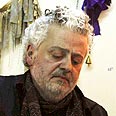
Palestinian at vanguard of Arab music renaissance
Twenty five years after leaving Lebanon, where his family fled from war during Israel's creation in 1948, composer and singer Marwan Abado is on his biggest Arab tour in Amman, Damascus, Aleppo, Beirut and Sidon
Growing up in the chaos of the Lebanese civil war, Palestinian composer and singer Marwan Abado used to practice the oud while his friends in a rough Beirut neighborhood were out carrying knives.
"Marwan thought far ahead of us. The Israelis were laying siege to Beirut. He was resisting with his oud," said Lebanese banker Hussein Jaber, a childhood friend of Abado, who later emigrated to Austria and studied the Arab string instrument under Iraqi maestro Assim Chalabi in Vienna.
"There was no electricity, but we used to play basketball while the night sky was being lit by shelling from warships. The fact that Marwan was a Maronite Christian in (mostly Muslim) West Beirut didn't matter."
Twenty five years after leaving Lebanon, where his family fled from war in Palestine during the creation of Israel in 1948, Abado is on his biggest Arab tour in Amman, Damascus, Aleppo, Beirut and Sidon.

Abado performs in front of members of Syrian society for music connoissuers (Photo: Reuters)
He is part of a small but dogged class of artists working on reinvigorating Arab music by integrating Western influences without detaching it from its roots.
But they are not among the mainstream in the Arab Middle East, which has seen a decline in artistic output over the last 50 years as autocratic governments crushed opposition, educations standards collapsed and artistic creativity was smothered.
Even Egypt's towering Imam Issa, a blind musician known as Sheikh Imam who identified with the country's huge underclass, has seen jail time for his political views.
Main figures in the renaissance generation now mostly reside in the West, including oud player Rabih Abou Khalil, one of the best-selling artists on Enja Records, who left for Germany in the late 1970s and made a triumphant return to his homeland in Lebanon at the 1999 Baalbek Festival.
Abou Khalil's ensembles have included Westerners on cello, violin and even the serpent, an old European instrument with holes instead of keys. But his music is steeped in Arab history, with oud, a pillar of Arab music, at the centre.
Another moderniser is Anouar Brahem, a Tunisian oud virtuoso who lived in France and collaborated with Britain's John Surman. Lebanon's Ziad Rahbani, son of Lebanese diva Fairouz and an accomplished jazz composer, stayed in his homeland.
Longing for 'a normal day in Palestine'
"You need a civil society for people like Marwan to take their rightful place," said Rasha Amran, organizer of a literary and musical festival in Syria's Mediterranean mountain region of Malaja that brought Abado to Syria for the first time in 2008.
"You listen to Marwan with his oud and the Austrian percussionist as if it's an orchestra playing," she added.
For the tour Abado is leading a band comprised of classically trained Australian violinist Joanna Lewis, who lives in Vienna and often plays with jazz musicians, Austrian bass guitarist Miki Liebermann, Polish clarinet player Maceij Golebiowski and percussionist Peter Rosmanith.
At a concert in Damascus Opera House on Tuesday, part of the tour to help raise money for UN Palestinian refugee schools, Golebiowski played the dukuk, an Armenian wind instrument, while Abado sang "Hawa al-Shimali" (northern wind), by Lebanese poet Talal Haidar.
"I was probably the last in my high school. I later found out what my parents had meant by saying that education was our major weapon as Palestinians," Abado told Reuters.

Abado (L) performs with Western musicians at Opera House in Damascus (Photo: Reuters)
His career owes to backing he found in Vienna, helping him "not define his audience" but form a music language of his own.
"A Palestinian would regard me from the same soil that produces Palestinian thyme. A Lebanese would think I was from Beirut and an Austrian would see me as an assimilated compatriot. Without music my work would not smell of wild thyme, or fulfil a longing for the art of Beirut," he said.
Austrian music writer Andreas Felber said even Europeans identify with Abado's themes of loss and longing, because "they're part of every day life that bond people".
Abado's last album "Nard" (dice) contains an oud solo he wrote about a "normal day in Palestine".
"Every day there is news. Every day there are images from a land called Palestine. Every day there is a struggle. Every day there is a farewell in a land called Palestine," he sings over the oud.
"I wish for a day without victories. Without murders, without injuries, just a normal boring day. And this normal, boring day will be a feast for a land called Palestine."
Abado's family came from Kfar Burum, a village on the border with Lebanon that was razed along with hundreds of Palestinian villages following the creation of Israel.
The 43-year old musician was in Amman, Damascus and Aleppo this week. A Beirut concert on Saturday was to be broadcast to an audience in Bethlehem.










